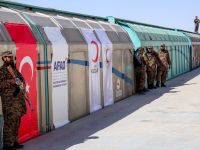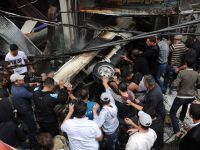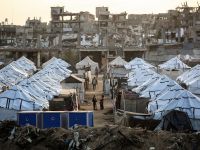Foreigners with humanitarian agencies in war-torn Afghanistan are keeping a "low profile" amid fears of violent protests against further UN sanctions, aid workers said.
Memories are still fresh here of last year, when furious mobs ransacked UN offices after aviation and financial sanctions were imposed against the ruling Taliban militia for its refusal to extradite indicted terrorist Osama bin Laden.
Now another seven sanctions, backed strongly by the United States, Russia and India, are on the table at the United Nations Security Council and a vote is expected soon.
"We are following the permanent security orders more closely than before, especially those limiting our movements around the city," one foreign aid worker told AFP.
Top UN officials stationed in Kabul said the prospect of more curbs against the puritanical Islamic militia were "not very heartening."
"Already we do not have very friendly relations -- they are always angry at us," one UN official said.
Taliban Foreign Minister Wakil Ahmad Mutawakel on Tuesday told AFP the militia would protect international aid workers as best it could.
"We are observing the situation. We try to maintain their security as far as we can," he said.
But he said the foreign aid community could be asked to quit Afghanistan if it became necessary for their security.
"If we come to know that it is better they leave Afghanistan, we will tell them there is a problem which the United Nations itself has created," Mutawakel said.
The US State Department on Wednesday said the new curbs under consideration include a unilateral arms embargo against the Taliban but not their armed opponents in the north, a freeze on bin Laden's financial assets and the closure of all Taliban offices overseas.
"The Taliban have ignored their obligation under UN Security Council Resolution 1267 (demanding bin Laden's extradition) and have continued to threaten international peace and security," it said.
"The measures now under consideration are specifically targeted narrowly on the Taliban leadership and on Osama bin Laden, his associates and his organization, al-Qaida."
It accused the Taliban of using profits from drug trafficking to fund their war effort, of spreading their "radical ideology" into Central Asia, China and Pakistan, and of ignoring humanitarian crises at home.
Other sanctions under discussion include a ban on the export to Afghanistan of acetic anhydride, used to make heroin, and a travel ban on top Taliban officials except for trips for negotiations, or for humanitarian or religious reasons.
"The reaction has the risk of being strong and we are thinking about it," said Eliane Duthoit, chief of the UN's operations in the capital, Kabul.
"We have taken no immediate measures but if there are violent reactions we could be obligated to evacuate our expatriate personnel.
"That will create problems for our programs because we won't be able to come back for a long time."
Some 360,000 people in Kabul alone depend on UN food, while the foreign aid community elsewhere is playing vital roles including mine clearing and providing urgent relief to millions hit by the worst drought in memory -- KABUL (AFP)
© 2000 Al Bawaba (www.albawaba.com)







